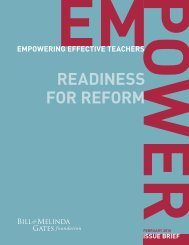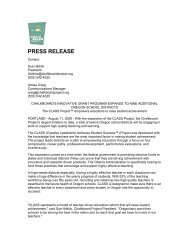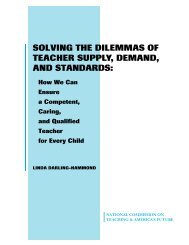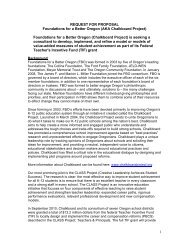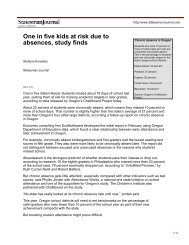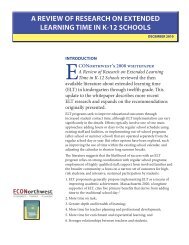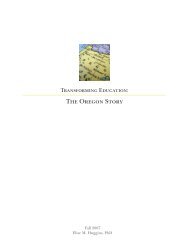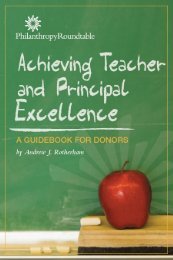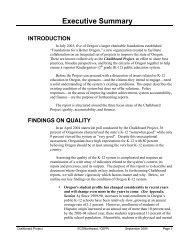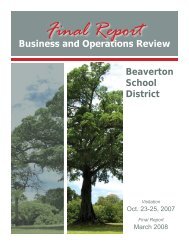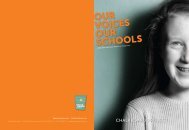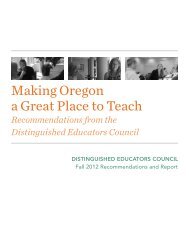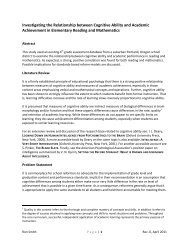Tapping the Potential - Alliance for Excellent Education
Tapping the Potential - Alliance for Excellent Education
Tapping the Potential - Alliance for Excellent Education
Create successful ePaper yourself
Turn your PDF publications into a flip-book with our unique Google optimized e-Paper software.
TA P P I N G T H E P O T E N T I A L : R E TA I N I N G A N D D E V E L O P I N G H I G H - Q U A L I T Y N E W T E A C H E R Sstudy groups, seminars, and online activitiesare all ways to organize teachers’ongoing learning. Providers may be leadersin <strong>the</strong> local school, district or state personnel,nearby university faculty, or thirdpartyexperts. However, all professionaldevelopment should meet <strong>the</strong> needs ofnew and experienced teachers to:• Expand content knowledge. Content knowledgeis not completed in college.Teachers continually need to enhance<strong>the</strong>ir knowledge of <strong>the</strong> subjects or fields<strong>the</strong>y teach. All teachers need to regularlyupdate <strong>the</strong>ir expertise, because <strong>the</strong>irdisciplines, and how to teach those disciplines,change over time.• Teach literacy and numeracy across <strong>the</strong> curriculum.Middle and high school teachersneed to rein<strong>for</strong>ce literacy andnumeracy <strong>for</strong> all <strong>the</strong>ir students, sinceadolescents are still developing reading,writing, and computation skills in latergrades. Teachers also need to be able todiagnose students who continue to readand solve problems at low levels toensure that <strong>the</strong>y receive <strong>the</strong> intensiveintervention <strong>the</strong>y need. Educators havelong thought that adolescents master literacyand numeracy well be<strong>for</strong>e <strong>the</strong>middle grades, and few secondaryteachers are prepared to teach suchskills. However, roughly one in fourhigh school seniors cannot read or solveproblems at <strong>the</strong> most basic levels. 83• Address diverse learning needs. High-qualityteachers understand that different studentslearn and per<strong>for</strong>m differently in<strong>the</strong> classroom. Diversity exists in learningstyles, learning disabilities, acquiringEnglish as a second language, and in cultureand community. Beginning teachersmust learn how to use this knowledge toadapt <strong>the</strong>ir teaching to individual learningneeds and help students use <strong>the</strong>irstrengths as <strong>the</strong> basis <strong>for</strong> growth. 84• Manage student behavior. Every new teachermust learn how to manage students duringhis or her first years on <strong>the</strong> job. NewThe United Federation of Teachers (UFT) Teacher Center atChristopher Columbus High SchoolThe state of New York funds 126 Teacher Centers to provide teacher-led professional development to new and existing teachers. The NewYork City UFT Teacher Center works in 300 schools, including Christopher Columbus High School, a large, comprehensive high school of 3,300students.The Teacher Center at Christopher Columbus serves all teachers, but particularly reaches out to new teachers through a range of servicesincluding semester-long seminars and study groups. Generally, <strong>the</strong> center holds a fall seminar to examine basic teaching methods andstrategies, and a spring study group on classroom management.In study groups, teachers meet <strong>for</strong> an hour once a week. Sessions are low-key, opening with a reflection on <strong>the</strong> classroom experiences of<strong>the</strong> preceding week and <strong>the</strong> successes and failures of <strong>the</strong> strategies that were applied. The group <strong>the</strong>n moves to reading and discussing acommon text. Finally, participants make personal decisions on one strategy or practice from <strong>the</strong>ir reading that <strong>the</strong>y will implement in <strong>the</strong>irclassrooms <strong>for</strong> <strong>the</strong> coming week. Their implementation experiences will become <strong>the</strong> basis <strong>for</strong> <strong>the</strong> opening discussion at <strong>the</strong> following meeting.Study groups are led by a trained staff facilitator who encourages new teachers to share ideas, learn from o<strong>the</strong>r teachers’ experiences, andidentify, through practice, what works with <strong>the</strong>ir individual students.These sessions may be supplemented with in-class support by <strong>the</strong> TeacherCenter staff.Professional development at <strong>the</strong> school is a collaborative ef<strong>for</strong>t, and <strong>the</strong> UFT Teacher Center works closely with a teacher consultant from<strong>the</strong> New York City Writing Project and a math consultant to provide additional support <strong>for</strong> new teachers in literacy and numeracy strategies. 85For more in<strong>for</strong>mation about <strong>the</strong> UFT Teacher Centers, see http://www.ufttc.org/modelnetwks.html.17



